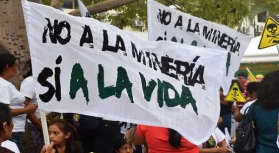Despite popular opposition, Bukele-aligned legislature overturns historic mining ban
On December 23, El Salvador’s Legislative Assembly voted to overturn the country’s historic 2017 ban on metals mining, representing a major threat to the country’s environment and drinking water supply, according to environmental groups. The vote took place less than a month after Nayib Bukele announced his intention to reverse the ban, following swift committee approval and only two hours of debate in the general assembly.
Bukele publicly announced his intention to overturn the mining ban in a series of tweets on November 27, claiming that “God has placed an enormous treasure beneath our feet” and that the only thing holding the country back from “unprecedented social and economic development” was the “absurd” mining ban.
Despite a State of Exception, which has suspended civil liberties since March 2022, hundreds of Salvadorans gathered at the gates of the Legislative Assembly on December 10 and December 23 to show their opposition to the reversal of the mining ban.
A UCA University Institute on Public Opinion (IUDOP) poll, published the day the law was approved, confirmed that the majority of the population was opposed to mining. Only 23% of respondents believed that mining was appropriate for El Salvador, while 61% stated that metals mining would have a negative environmental impact.
The passage of the law triggered a wave of responses from diverse sectors of Salvadoran society. The Catholic Church, instrumental in the 2017 law banning metals mining, condemned the decision. “We regret that the law allowing mining in our country has been approved, without listening to the population. This act goes against the will of the people and ignores their 2017 victory, the passage of a law prohibiting mining exploitation, which protected life and health in our nation.”
The University of El Salvador (UES), the country’s only public university, also rejected the law. It called on the government to consider its extensive environmental impacts. “The UES expresses its opposition to the approval of the law. We reiterate that all scientific studies show that mining activities, regardless of their scale or type, generate serious and in many cases irreversible social and environmental impacts, which will negatively impact El Salvador even more, due to its limited size, high population density and critically depleted water resources.”
Social movement and civil society organizations that spearheaded the Legislative Assembly protests called on communities and organizations across the country to unite in defense of clean water. The National Roundtable Against Metals Mining, an alliance of environmental groups and communities threatened by resource extraction, reaffirmed their commitment to preventing “the plundering and pollution of natural resources as a result of the activities of the metals mining industry.”
The Popular Rebellion and Resistance Bloc announced a march on January 12 to commemorate the anniversary of the 1992 Peace Accords and reject the setbacks caused by “the Bukeles and their oligarchic and imperialist allies.”
Salvadorans and allies also gathered at El Salvador’s embassy in Washington, D.C. on December 23 to express their rejection of the new mining law.
The Santa Marta 5 case continues
The reversal of the metals mining ban comes amidst the extension of the case against the Santa Marta 5, a group of environmentalists who were active in the campaign to pass the historic 2017 law. They were found not guilty in a unanimous decision by the Sensuntepeque Sentencing Tribunal on October 18, following nearly two years in pretrial detention and house arrest.
Despite being supported by a massive domestic and international campaign that included the UN Special Rapporteur for Human Rights Defenders, the Cojutepeque Appeals Chamber accepted an Attorney General’s office appeal. In a controversial decision that Saúl Rivas, one of the Santa Marta 5, calls “politically motivated,” the judges ordered a new trial despite no new evidence being presented against the men.
Rivas, an attorney with the Economic and Social Development Association of Santa Marta (ADES), also drew the connection between their case and the overturning of the mining ban. “We stated from the beginning, as ADES and the Santa Marta community, that the reason for our detention was because we denounced the possible reactivation of mining in Cabañas. And with the new government announcements, it is clear that we were not wrong. That is what is happening.”
The new trial is scheduled to take place during the first week of February.


 "I am a CISPES supporter because continuing to fight for social justice and a more people-centered country means continuing the dream and sacrifice of thousands of my fellow Salvadorans who died for that vision.” - Padre Carlos, New York City
"I am a CISPES supporter because continuing to fight for social justice and a more people-centered country means continuing the dream and sacrifice of thousands of my fellow Salvadorans who died for that vision.” - Padre Carlos, New York City

